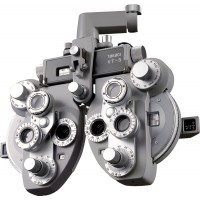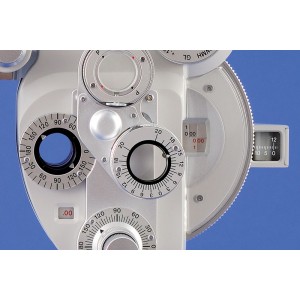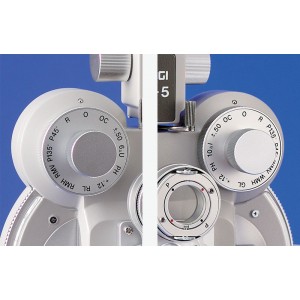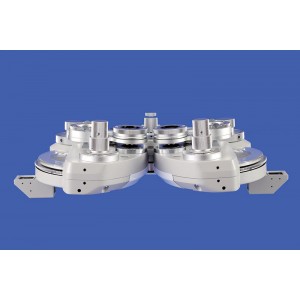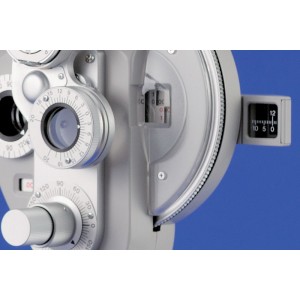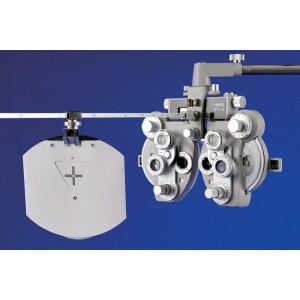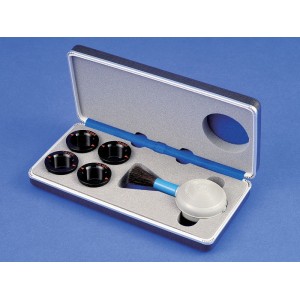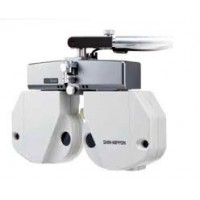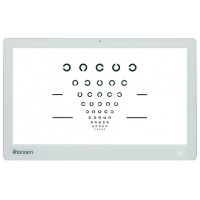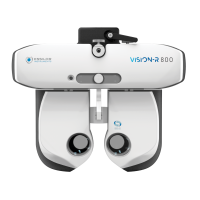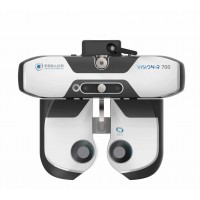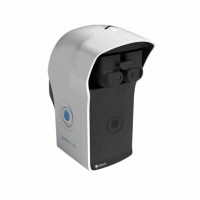VT-5
New Generation of Multi-Functional Instrument
Takagi has drawn on their wide experience and vast amount of technical know-how accumulated in this field to develop a more precise and labour saving tester and its highest performance wins a greatest popularity among many users all over the world as well as in Japan.
Outstanding features
Attractive delicate, beautiful design.
The precise function of the instrument means smoother operation in testing for myopia and astigmatism.
Cross cylinder and rotary prism provide the widest field of view.
Employs an unique mechanism in convergence system.
Testing range greatly widened by the big selection of auxiliary lenses provided.
Greater precision and durability provided with the oil less bearings.
By using together with the chart projector, a wide range of visual function (binocular vision, stereopsis, aniseikonia, and so on) can be examined.
High-grade coating executed on all surfaces of lenses.
Level adjustment
Level adjustment can be made easily in one-touch operation by using the levelling knob and level.
Interpupillary adjustment
The wide range of adjustment of 48mm through 80mm and easy to read scale in 1mm graduation.
Convenient knobs, located on both sides, enable smooth and rapid adjustment.
Adjusting Sphere Power Readings
Adjustment can be made exactly from -19.00D to +16.75D in 0.25D steps and the sphere power rapid feed dial allows rapid eye examination per ±3.00D. With accessory lenses, it is possible to read up to ±0.12D. Also, the auxiliary lenses ±10.00D(option) are available to extend adjustment range up to -29.00~ +26.75D.
Adjusting Cylinder Power and Axis
The cylinder lens graduated in 0.25D steps allows adjustment up to 0 ~ -6.00D and with accessory lens -2.00D, it is possible to extend adjustment range up to -8.00D. The cylinder axis can be adjusted up to 0°~ 180°in 5°steps. Each adjustment can be made rapidly with two knobs on the same axis.
Cross Cylinder (±0.25)
The cross cylinder loop, through a special mechanism synchronized completely with the cylinder lens axis control knob, automatically rotates to a corresponding axis each time you change the cylinder lens axis.
Rotary Prism
The readings can be taken accurately up to 20△ in 1△ scale graduation. Also, the click stop permits you to measure horizontal and vertical strabismus and heterophoria. Using both right and left prisms makes you possible to take readings up to 40△ test eye balance.
Built-in Auxiliary Lenses
| Left | Right | |||
| O | Open aperture | O | Open aperture | |
| OC | Occluder | OC | Occluder | |
| ±.50 | ±0.50D cross cylinder | ±.50 | ±0.50D cross cylinder | |
| 6△U | 6 prism diopter base Up | 6△U | 6 prism diopter base Up | |
| PH | Pin hole | PH | Pin hole | |
| +.12 | +0.12D auxiliary lens | +.12 | +0.12D auxiliary lens | |
| RL | Red filter | RL | Red filter | |
| RMH | Red maddox rod, horizontal | RMH | Red maddox rod, horizontal | |
| RMV | Red maddox rod, vertical | RMV | Red maddox rod, vertical | |
| P135° | Polarizing filter, axis 135° | P135° | Polarizing filter, axis 135° | |
| P45° | Polarizing filter,axis 45° | P45° | Polarizing filter,axis 45° | |
| R | Retinoscopic lens, +2.00D, for 50cm | R | Retinoscopic lens, +2.00D, for 50cm | |
Convergence System
Precision measurement is possible with lens setting to suitable angle for near testing (by closing the convergence lever inward) as well as distance (by opening it outward). This converges the optical system coincident to the convergence of the patient’s eyes and the patient can always look through the correct optical centres. Thus, this unique system insures perfection in testing.
Corneal Aligning Device
Through the sight, align the corneal vertex of the patient and set the patient’s cornea in correct position (at 12mm from the view tester lenses).
Measurement should be made at ”0” position of the scale.
Near Point Scale and Chart
The scale is graduated in “lnch”, “Centimeter” and “ Diopter”. It can be set at distance you like for use and when not in use, it can be stored in standing position. The Near Point Chart contains a rotatable disc with 12 kinds of tests at both sides. The scale is 67cm in length.
Forehead Rest
The knob adjusts distance between cornea and lenses and makes positioning of the patient’s forehead very smooth.
Accessory Lenses
-0.12C 2 pcs / -2.00C 2 pcs
(Option)
+10.00S 2 pcs / -10.00S 2 pcs
Built-in Auxiliary Lenses
| Left | (O)Open Aperture/(OC)Occluder/(±.50)±0.50D Cross Cylinder/(6△U)6 Prism Diopter, Base Up/(PH)Pin Hole/(+.12)+0.12D Auxiliary Lens/(RL) Red Filter/(RMH)Red Maddox Rod, Horizontal/(RMV)Red Maddox Rod, Vertical/(P135°) Polarizing Filter, Axis 135°/(P45°) Polarizing Filter, Axis 45°(R)Retinoscopic Lens, +2.00D, for 50cm |
| Right | (O)Open Aperture/(OC)Occluder/(±.50)±0.50D Cross Cylinder/(10△l)10 Prism Diopter, Base In/(PH)Pin Hole/(+.12)+0.12D Auxiliary Lens/(GL) Green Filter/(WMH)White Maddox Rod, Horizontal/(WMV)White Maddox Rod, Vertical/(P45°) Polarizing Filter, Axis 45°/(P135°) Polarizing Filter, Axis 135°(R)Retinoscopic Lens, +2.00D, for 50cm |
| Spherical power adjustment | +16.75D to -19.00D in 0.25 steps(in 0.125D steps when +0.12D auxiliary lenses are in use) +26.75D to -29.00D(when optional lenses are in use) |
| Cylindrical power adjustment | 0 to -6.00D in 0.25D steps(in 0.125D steps when -0.12D auxiliary lenses are in use) 0 to -8.00D(when auxiliary lenses are in use) |
| Rotary prism | 0 to 20 prism diopters, with minimum 1△steps |
| Interpupillary adjustment | 48mm to 80mm(right and left synchronized),with minimum 1mm steps |
| Forehead-rest adjustment | 16mm |
| Convergence | ∞ to 400mm |
| Dimensions | 291-323mm wide × 315mm long × 85mm thick(including knobs ; 39mm for instrument only) |
| Weight | 5 kgs |
| Accessories | Auxiliary lenses(cylinders : -2.00D/2pcs, -0.12D/ 2pcs) ; A kit of near point vision chart ; Sanitary face shield, 1 each right and left ; Others |

